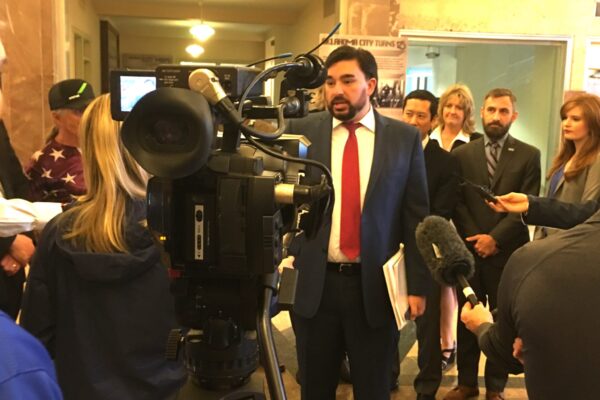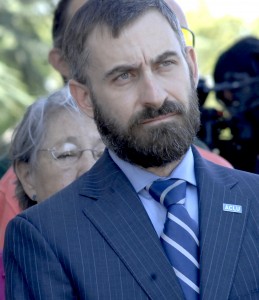Criminal Justice Reform
The Criminal Law Reform Project (CLRP) focuses its work on the “front end” of the criminal justice system—from policing to sentencing— seeking to end excessively harsh criminal justice policies that result in mass incarceration, over-criminalization, and racial injustice.

The Criminal Law Reform Project (CLRP) focuses its work on the “front end” of the criminal justice system—from policing to sentencing— seeking to end excessively harsh criminal justice policies that result in mass incarceration, over-criminalization, and racial injustice, and stand in the way of a fair and equal society.
By fighting for nationwide reforms to police practices, indigent defense systems, disproportionate sentencing, and government abuses of authority in the name of fighting crime, and drug policies which have failed to achieve public safety and health while putting an unprecedented number of people behind bars, CLRP is working to reverse the tide of over-incarceration, protect constitutional rights, eliminate racial disparities, and increase government accountability and transparency.
The Latest

Oklahoma House’s Shameful Scuttling of Criminal Justice Reform Measures
OKLAHOMA CITY--Blame for the Oklahoma House’s shameful last-minute scuttling of monumental criminal justice reform measures with overwhelming bipartisan support falls squarely on House leadership. Despite having a clear mandate from voters to reverse the unsustainable and destructive course of Oklahoma’s overly harsh, discriminatory, and counterproductive criminal justice system, House leaders tucked tail and capitulated to out of touch, taxpayer subsidized lobbying groups. While the public face of this cowardly act of obstructionism has been Rep. Scott Biggs, R-Chickasha, a deeper scorn should be directed at House Speaker Charles McCall, R-Atoka. Speaker McCall may have for the time being escaped blame for this embarrassment, but history will hold him accountable. Only the weakest of Speakers would pretend that obstinate committee chairs like Biggs are beyond their control. There is only one member of the House of Representatives who has the power to keep the entire body from casting an up or down vote on any bill and that is the Speaker of the House. “This is a transformative moment for criminal justice reform and legislators had an opportunity to seize that momentum and be leaders in ending the suffering Oklahomans are enduring daily in a state criminal justice system that has reached crisis-level status,” said Ryan Kiesel, Executive Director at the ACLU of Oklahoma. “But instead of leading, they capitulated to a small group of politicians whose political and financial interests are married to the broken status quo. By killing this widely-supported plan, Speaker McCall subverted the will of the voters, ignored his own membership and disrespected an overwhelming coalition of supporters who came together to demand action before it is too late. Speaker McCall should be as ashamed of himself as many Oklahomans – including his own colleagues – are of him.” A package of bills recommended by the Governor’s Criminal Justice Reform Task Force advanced through the Legislature with strong support early in session. Governor Fallin herself played a consistent leadership role through this whole session. By recognizing the need for immediate reforms, proposing thoughtful, evidence based solutions to our crisis, and using her political capital to push a smart justice agenda, the Governor has proven her commitment to this worthy cause. In another catastrophic budget year, the bills presented a chance to save nearly $2 billion in ineffective corrections spending by reforming Oklahoma’s justice system to resemble the more humane, cost-effective systems other states and countries have adopted with proven success. Despite overwhelming support for these evidence based reforms, in the final month of session, McCall and Biggs tried to quietly sweep those bills under the rug. When it blew up in their faces the last week of session, they doubled down and killed the bills.“It appears the supposed support for reform House leadership expressed this session was a lie all along. It is not hard to conclude that Speaker McCall planned the demise of this proposal months ago, but strung it along under false pretenses as a negotiation chip to extract what he wanted from the Senate and Governor Fallin this session, all the while cultivating a public image of someone committed to reforms. It was politics at its worst, and voters should not forget it,” Kiesel said. “These antics combined with the shell game that was played with teacher pay raises this session offer hard evidence that the majority in the House of Representatives are working to actively deceive the people of Oklahoma by hiding what they're actually up to.” How it happened

Asset Forfeiture Bill Important For Reform Effort, ACLU OK Says
Under the bill, a citizen can recover his or her attorney’s fees if they successfully contest a forfeiture action. The bill cleared the Senate Judiciary Committee unanimously on Tuesday.
The bill now goes to the full Oklahoma Senate for consideration.
Kiesel said the committee vote shows that Oklahomans remain concerned about the civil asset forfeiture system. “It is unfortunate that efforts at wholesale reform have stalled for the moment, but we remain hopeful that the voices of large numbers of Oklahomans demanding even more reforms will eventually be heard and will one day become law,” he said.
Kiesel praised the work of legislators on both sides of the aisle for bringing this important issue to the forefront.
“Because of the work done by lawmakers such as Senators Kyle Loveless and David Holt and Representative Cory Williams, Oklahomans are more aware of the flaws in the system. Their ability to transcend normal partisan divides is a testament to their leadership and to t
Stay Informed
Sign up to be the first to hear about how to take action.
By completing this form, I agree to receive occasional emails per the terms of the ACLU’s privacy statement.
By completing this form, I agree to receive occasional emails per the terms of the ACLU’s privacy statement.


